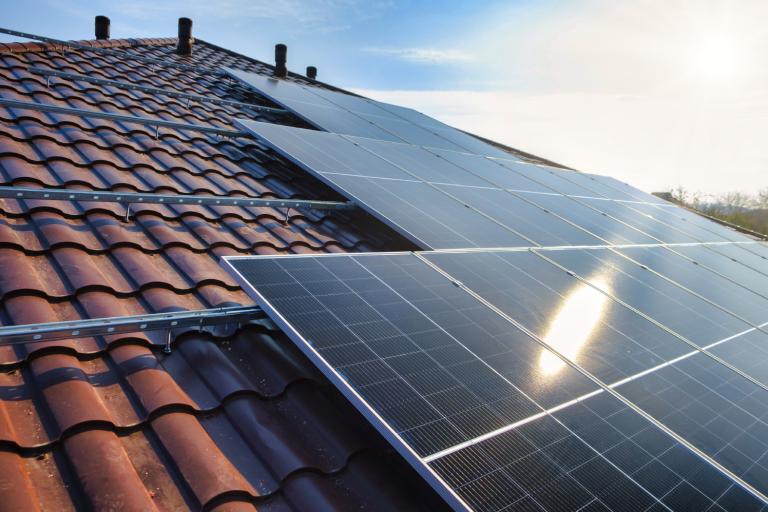Solar photovoltaic (PV) panels
Solar photovoltaic (PV) panels convert sunlight into electricity, providing the following benefits:
- renewable energy to power your home
- lower energy bills
- reduce carbon emissions
They are typically installed on roofs, with unshaded south-facing roofs being ideal. East or west-facing roofs can also work, but will produce about 15–20% less energy.
Flat roofs may need angled mounting frames may be needed for better efficiency.
You may need to add a PV diverter, to direct excess electricity from your panels to heat your water, therefore reducing energy costs for hot water.
Ensure your roof is in good condition and strong enough to support the panels. Your installer will conduct your roof for suitability, and structural improvements may be needed before installation.
- The Centre for Sustainable Energy provides a Solar PV guide detailing the costs, savings, benefits and other useful information including getting the best from your solar PV panels.
- Energy Saving Trust has a comprehensive guide to solar panels.
- The Planning Portal has all the planning permission you require for a Solar PV project including planning permission for solar panels.
Cost: £500 to £5,000–£10,000
Disruption Level: Low

Solar thermal panels
Solar thermal panels use sunlight to heat water stored in a cylinder. They use tubes filled with a water-glycol mix that transfers solar heat to the water cylinder.
While solar thermal systems do not meet all your hot water needs throughout the year, they do help raise the water’s base temperature. They do this by reducing the workload of your boiler or immersion heater.
South-facing roofs are best for solar thermal panels. They work with most conventional boilers and hot water cylinders.
If you have a home with combi-boiler you will need to install a separate hot water cylinder, so consider the amount of space you need.
Other considerations include ensuring your roof is in good condition and strong enough to support the panels. Your installer will assess the roof, and any necessary upgrades must be completed before installation.
The Centre for Sustainable Energy provides a solar water heating guide detailing how you can be energy efficient and save money.
The Energy Saving Trust also has useful information about solar thermal panels.
Regulatory considerations for Solar PV and Solar thermal panels
- Installing a solar thermal system is considered permitted development.
- In conservation areas, solar thermal panels cannot be placed on roofs that face a road.
- Listed building consent is required for listed buildings.
Relevant building regulations include:
- Part A (Structural Safety) – Ensuring the roof can support the panels
- Part G (Sanitation, Hot Water Safety, Water Efficiency) – When modifying the hot water system
- Part J (Combustion Appliances & Fuel Storage) – When modifying a boiler system
- Part P (Electrical Safety)
Cost: £500
Disruption Level: Low
